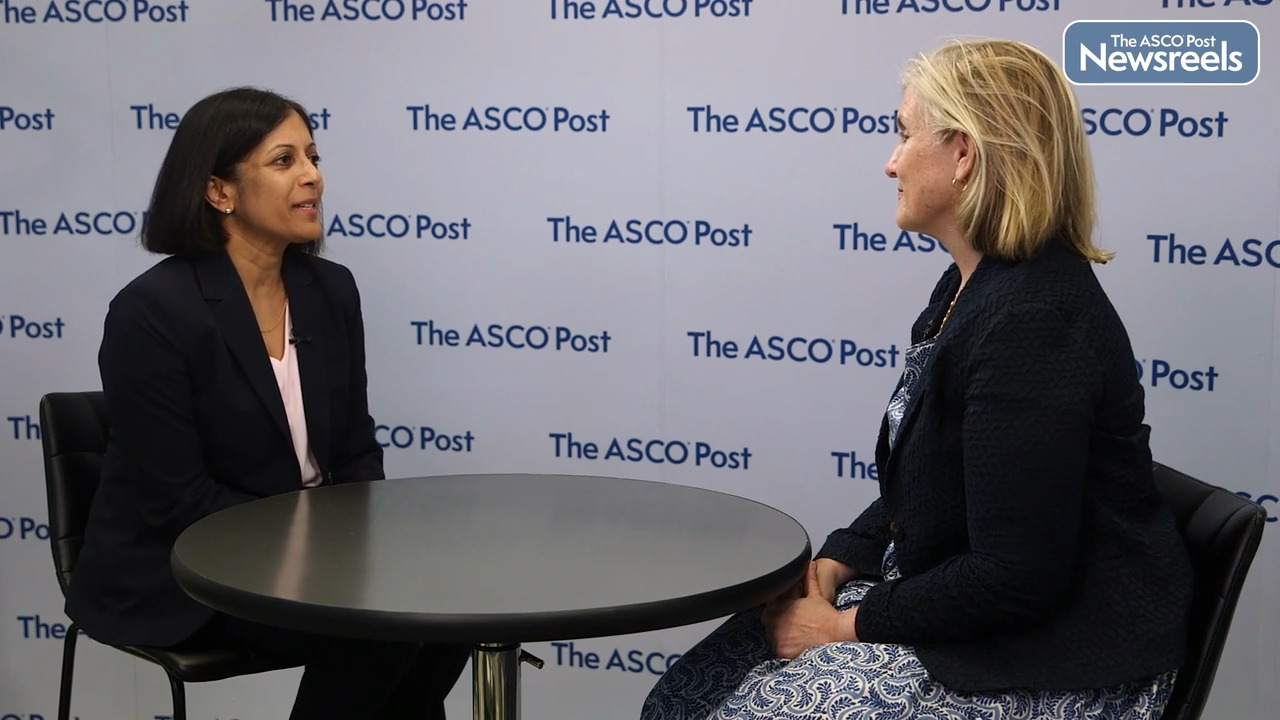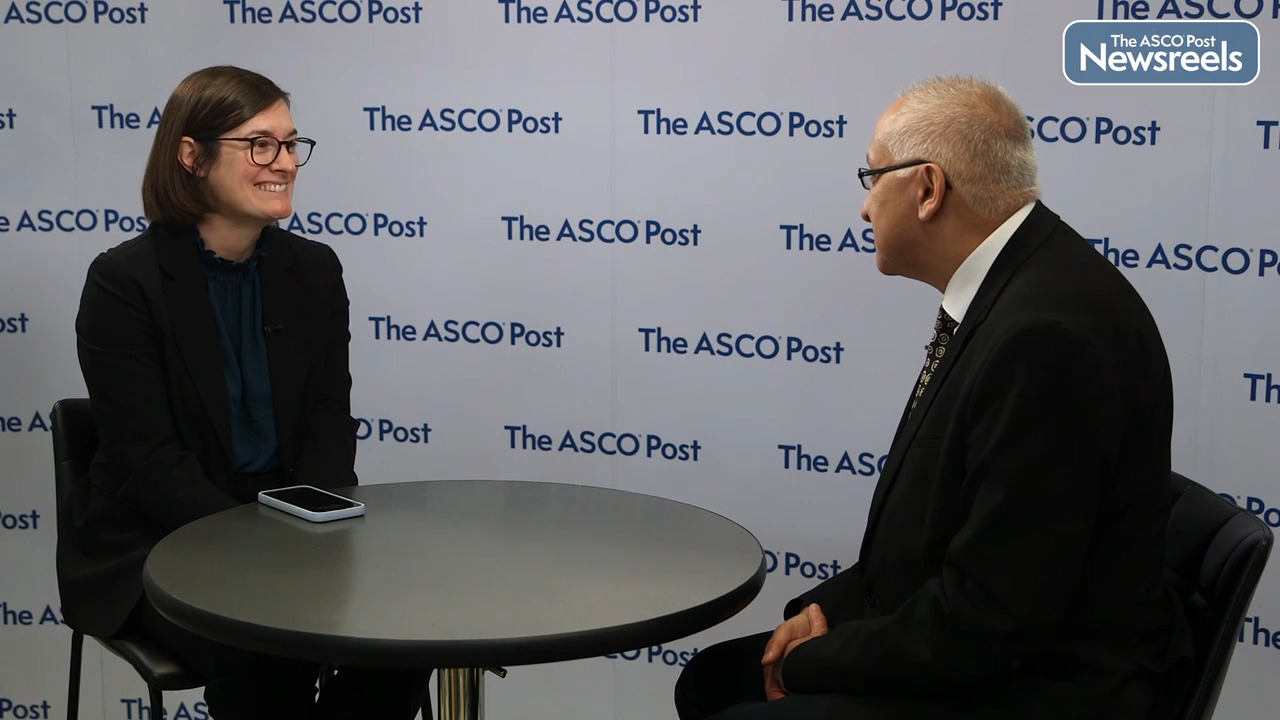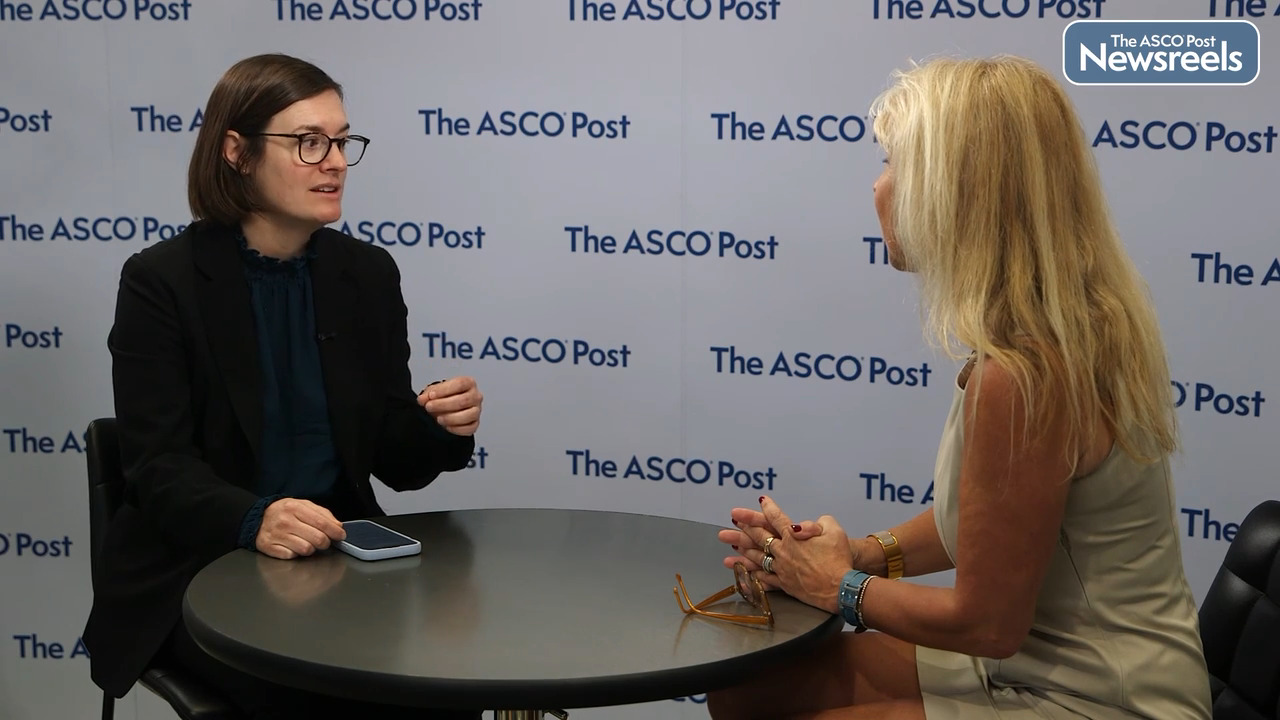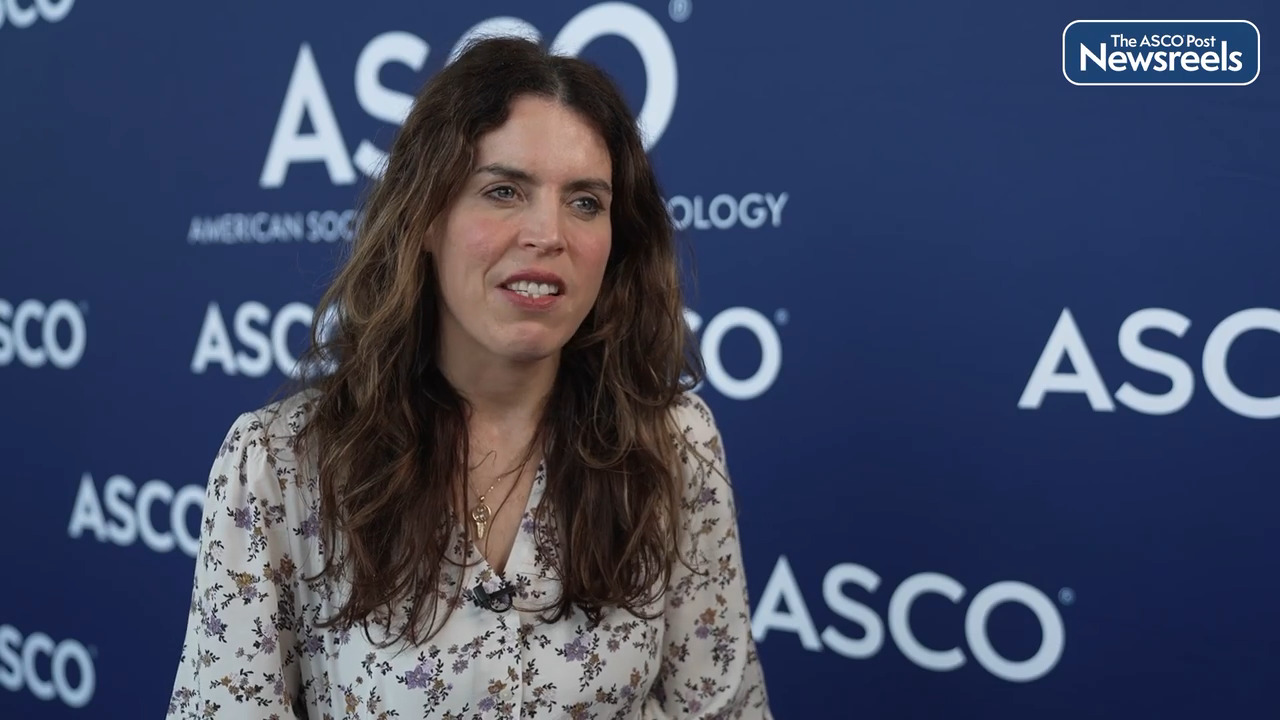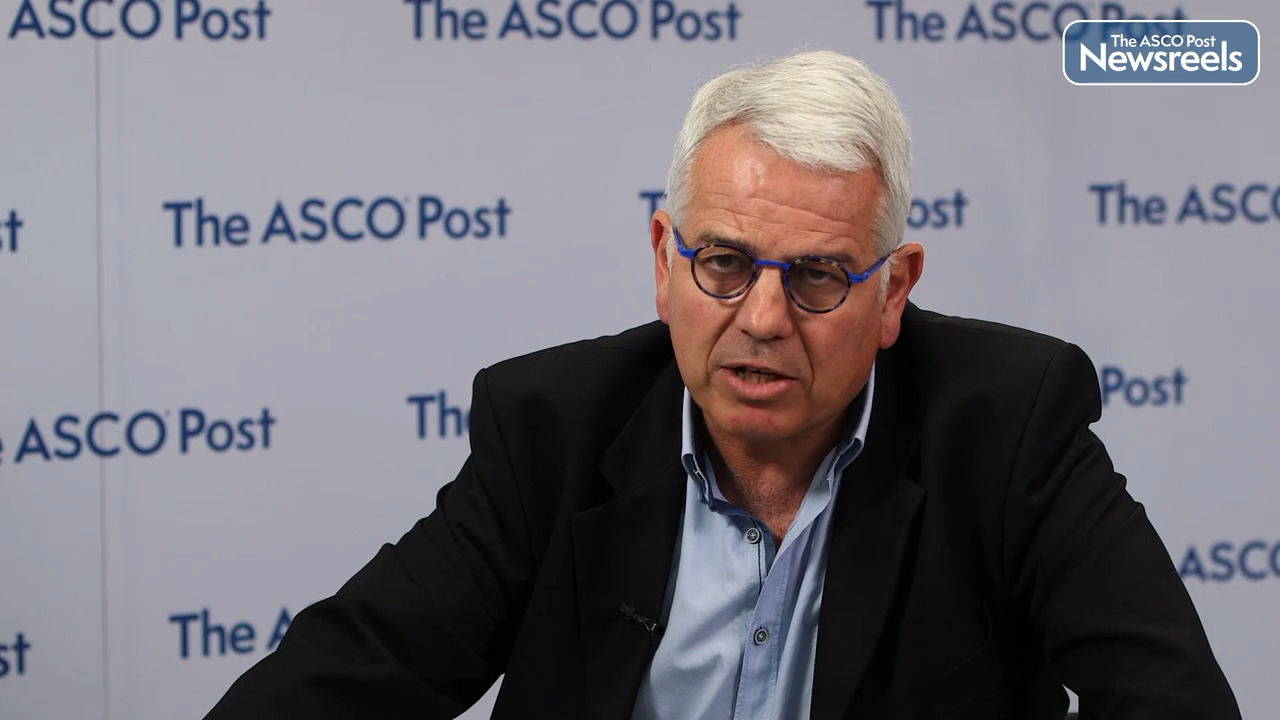Transcript
Disclaimer: This video transcript has not been proofread or edited and may contain errors.
Allison Betof Warner:
Adnan, thank you so much for joining us today. I'm really excited to talk about your abstract from KEYNOTE-942. Do you want to tell us just briefly about the trial design?
Adnan Khattak:
Okay, thank you, Allison. I presented the data from the KEYNOTE-942, which is a phase two randomized study of combination in new antigen therapy with mRNA-4157, along with pembrolizumab compared to pembrolizumab monotherapy and resected high risk stage 3B, C, D, and stage four cutaneous melanoma patient. The study was designed in a two-to-one fashion with plans to determine if the combination offers any extra benefit on top of the standard of care from pembrolizumab.
Allison Betof Warner:
Great. And I know there's been a ton of buzz about this since we saw the data initially presented at the ACR meeting and now updates from the ASCO meeting. Maybe tell us briefly about the primary endpoint, which I know was already presented and updated at ASCO, and then the secondary endpoint, which I know had some exciting data that was presented at ASCO.
Adnan Khattak:
The primary endpoint of the study was relapse free survival. We presented that data at ACR. A combination treatment demonstrated an improvement in relapse free survival compared to monotherapy with pembrolizumab. The hazard ratio was 0.56, so a 44% relative risk reduction. And if you look at the 18-month RFS time points, there was about 16% absolute improvement in relapse free survival. In this meeting we presented the data from the distant metastasis-free survival where the combination also demonstrated that there was significant improvement in distant metastasis-free survival compared to pembrolizumab monotherapy with a hazard ratio of 0.34. This translates to about a 65% relative risk reduction and about a 15% improvement in distant metastasis-free survival at 18-month time point. Very exciting data.
Allison Betof Warner:
Yeah, I would say I was blown away by the DMFS data. I think there was interest when this was recurrence-free survival. But, that was a really impressive hazard ratio for DMS.
Adnan Khattak:
Distant meta free survival is a very clinically relevant endpoint because patients die from distant relapse rather than local relapse. If you've got a treatment which is reducing the risk of distant relapse, it's important because distant relapse leads to higher mobility and mortality in patients.
Allison Betof Warner:
And so just to highlight that too, I think one of the key things that we think about with DMFS is if you have a local recurrence often that can just then be re-resected with surgery, treated with radiation or injectable local therapy. But, this idea of preventing distant disease and potentially more systemic therapy is really key.
Adnan Khattak:
I think in the data that I presented, so we also looked at the patterns of distant metastasis-free survival events and how it panned out during and after treatment. I think the combination clearly demonstrated that there were far few distant relapses happening later on during the treatment journey for patients. There's a certain group of patients who will relapse early, both in the pembrolizumab monotherapy and also in the combination now. But, it's the more the late relapses, which were far few less compared to pembrolizumab and monotherapy. But, many patients experienced distant relapse, particularly after discontinuation of treatment.
Allison Betof Warner:
Beautiful. Tell us maybe briefly about the toxicity differences between the arms, the standard of care pembro versus the vaccine plus pembro.
Adnan Khattak:
I think in the adjuvant setting, obviously we can't use the treatment where there's high toxicity associated. Unfortunately, there were no significant difference in terms of immune related adverse events seen with a combination compared to monotherapy with a rough statistic, roughly about 10 to 15%, which is fairly standard with immunotherapy studies. In terms of grade three or four adverse event in general, they were fairly similar, about 35% in both the groups.
No new safety signals were seen with pembrolizumab in the combination arm. And coming to the more important point of the mRNA vaccine related adverse event, about 11.5% of patient had grade three or higher adverse events related to the vaccine. But, in about 80% of the cases, they were grade one or two and they were self-limiting. The symptoms lasted for about 24 to 48 hours and include the common side effect that we see associated with mRNA vaccines given for COVID. They included fever, chills, muscle aches, and injection site reactions. Then they were fairly easily manageable.
Allison Betof Warner:
Fantastic. Beautiful data. I think the question in all of our minds is what comes next from this?
Adnan Khattak:
I think two important things. First is to, obviously, this is a phase two study, so 157 patients were treated as part of this trial. We need to reproduce this data. We've seen a very strong signal from this phase two study. I think we've been called out previously, but I think we need to reproduce this data in the phase three setting. A phase three study is planned in collaboration between Merck and Moderna. Starting later in this year for stage 2B or higher melanoma. The other important thing is to try to identify which is the group of patient that need a particular treatment. There's certain group of patient who are cured by surgery alone. There's certain group of patient that will be cured by pembrolizumab monotherapy. And then there's an additional group of patient that will need combination treatment. And then there's also another still unmet area of need where patients relapse despite receiving the combination treatment. I think biomarker research will be fairly important to try to tease out which group of patients should be given a particular treatment.
Allison Betof Warner:
And I know Dr. Carlino at ASCO presented some very nice data on ctDNA but I think much more from the biomarker space to come.
Adnan Khattak:
Exactly. I think we looked at the circulating tumor DNAs one facet, and then we also looked at, which be presented at ASCR, the tumor mutational burden, tumor inflammation score, and also the PDL1 data as well. I think the combination therapy related clinical benefit holds true for all these subsets.
Allison Betof Warner:
And I think last question I have for you is just how do you see this, assuming the phase three were to be positive, how do we roll this out for patients on a larger scale?
Adnan Khattak:
I think patient lacks the concept of one therapy for one patient is a very individualized approach. But, I think figuring out the logistics of a personalized mRNA vaccine would be something that I think we need to figure out. The turnaround time in this trial roughly was about six weeks from the time we sent off the tumor and the blood samples to the central lab, and then with the vaccine being made and we sent back to us. There was a six weeks turnout time.
We got that time in the adjuvant setting because patients started pembrolizumab, which is a standard care of treatment. But obviously, if we are to evaluate this in the metastatic setting where patients might deteriorate fairly rapidly, particularly in other tumor types, for example, if you are looking at pancreatic cancer, there is some data coming along, as well. We need to have a treatment which you can start early so that it start working quickly, in the best interest of our patients.
Allison Betof Warner:
For sure. I'm really looking forward to more exciting data to come from this study and certainly from the phase three. Thank you so much for chatting with me today.
Adnan Khattak:
Thank you, Allison.
